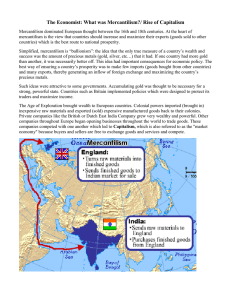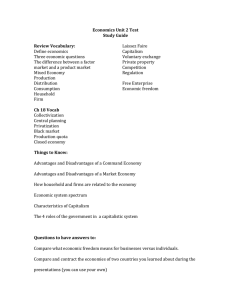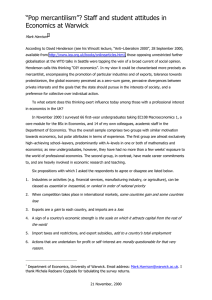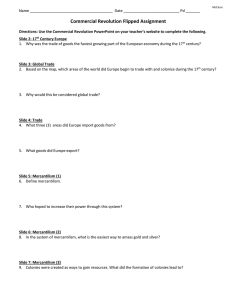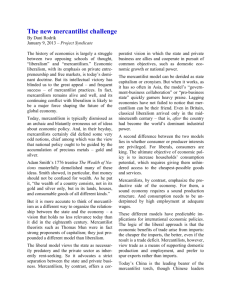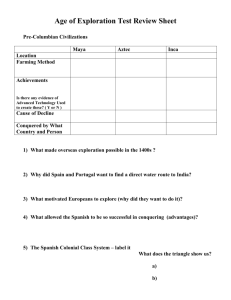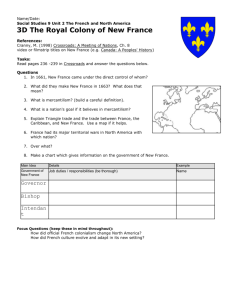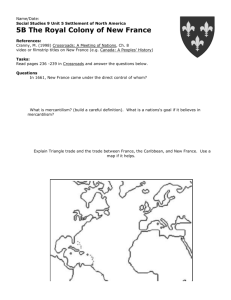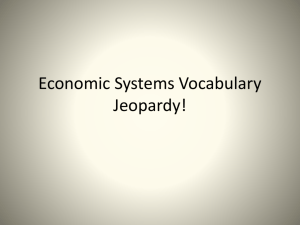E307 1 The Beginnigs..
advertisement
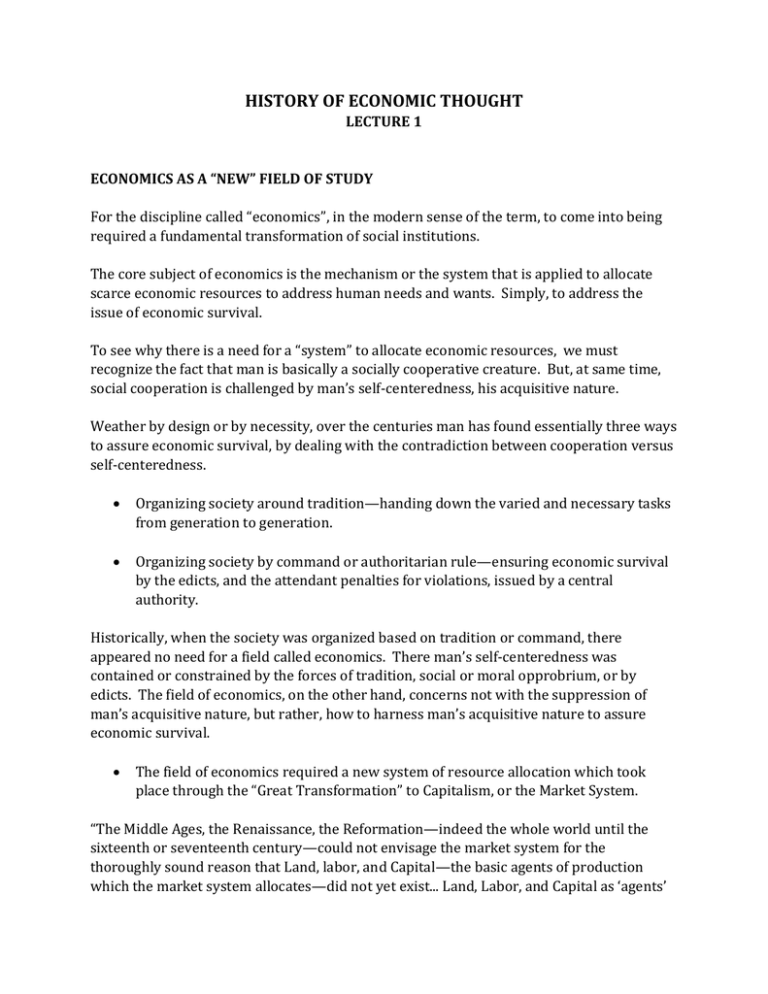
HISTORY OF ECONOMIC THOUGHT LECTURE 1 ECONOMICS AS A “NEW” FIELD OF STUDY For the discipline called “economics”, in the modern sense of the term, to come into being required a fundamental transformation of social institutions. The core subject of economics is the mechanism or the system that is applied to allocate scarce economic resources to address human needs and wants. Simply, to address the issue of economic survival. To see why there is a need for a “system” to allocate economic resources, we must recognize the fact that man is basically a socially cooperative creature. But, at same time, social cooperation is challenged by man’s self-centeredness, his acquisitive nature. Weather by design or by necessity, over the centuries man has found essentially three ways to assure economic survival, by dealing with the contradiction between cooperation versus self-centeredness. Organizing society around tradition—handing down the varied and necessary tasks from generation to generation. Organizing society by command or authoritarian rule—ensuring economic survival by the edicts, and the attendant penalties for violations, issued by a central authority. Historically, when the society was organized based on tradition or command, there appeared no need for a field called economics. There man’s self-centeredness was contained or constrained by the forces of tradition, social or moral opprobrium, or by edicts. The field of economics, on the other hand, concerns not with the suppression of man’s acquisitive nature, but rather, how to harness man’s acquisitive nature to assure economic survival. The field of economics required a new system of resource allocation which took place through the “Great Transformation” to Capitalism, or the Market System. “The Middle Ages, the Renaissance, the Reformation—indeed the whole world until the sixteenth or seventeenth century—could not envisage the market system for the thoroughly sound reason that Land, labor, and Capital—the basic agents of production which the market system allocates—did not yet exist... Land, Labor, and Capital as ‘agents’ of production, as impersonal, dehumanized economic entities, are as much modern conceptions as the calculus.” What were the causes of the Great Transformation? Among them: Gradual erosion and disappearance of the decentralized system of feudalism and emergence of national political units under centralized monarchies in Europe. Navigational explorations which lead to the discovery of the “New World” and new routes to the Orient in the sixteenth and seventeenth centuries. This brought a flood of gold and other treasures to Europe. Accumulation of gold and treasure became the order of the day among the social elite. The rise of the “Protestant Ethic”, which brought about a new attitude toward work and wealth. (Max Weber, The Protestant Ethic and the Spirit of Capitalism) The Protestant leaders, “Far from eulogizing the life of poverty and spiritual contemplation, ..., preached that it was pious to make the most of one’s God-given talents in daily business.” [RH, p 35] Rise in the population of Europe; birth and growth of new towns with interconnecting roads which facilitated inter-urban trade and distribution of foodstuff from rural to urban areas. Rise in scientific curiosity, and major inventions such as the printing press, the mechanical clock, the map, etc... With the Great Transformation to capitalism, “The problem of [economic] survival was henceforth to be solved neither by custom nor by command, but by the free action of profitseeking men bound together only by the market itself.” [RH p 37] Thus, the Great Transformation required a new way of thinking about the means for man’s economic survival and welfare. MERCANTILISM Mercantilism refers to a group of pamphlets and essays regarding national economic policy that dominated economic thinking in the seventeenth and most of the 18th century. The term “mercantilism” was coined by Adam Smith in The Wealth of Nations. Smith’s book was published in 1776, the year which marks the beginning of the modern field of economics. Although the subject of mercantilist writers was economic policy, mercantilism is considered a somewhat disparate set of political ideologies rather than a systematic theoretical economic thinking. In other words, mercantilism was not about the workings of capitalism and the market system. The highlights of mercantilist way of thinking are as follows: Mercantilism was mainly a set of economic policy prescriptions for rulers whose aim was to promote their country’s interests, its wealth, and power relative to other nations. The policy prescription were not for the improvement of the welfare of ordinary citizens or the general public. The means to increase the country’s wealth and power was to adopt a policy of “autarky”, that is, self-sufficiency in production of all goods, particularly manufactured goods. Imports should be restricted mainly to raw materials to support domestic manufacturing. The principal policy prescription for a well-functioning domestic industry was the availability of currency (money) to support the payments system. By “currency” mercantilists meant, not the money supply controlled by a central bank, but the precious metals of gold and silver. The main channel to increase the supply of currency was the inflow to the country of precious metals. This should be done, in addition to the extraction gold and silver from the colonies (mainly, the New World), through the inflow of precious metals from other countries in exchange for manufactured goods exported to those countries. “An implication of the dominant [mercantilist] view was that the government ought to pursue an active economic policy to stimulate export and nurture domestic industries that competed with foreign firms in the same industry while limiting imports. It was against this aspect of mercantilist thinking that Adam Smith above all came to direct his polemic.” [AS, p 20]
